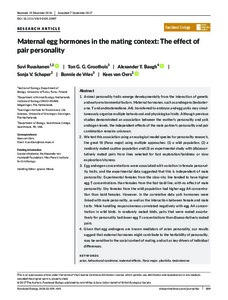Maternal egg hormones in the mating context: The effect of pair personality
Groothuis TGG; van Oers K; Schaper SV; Baugh AT; de Vries B; Ruuskanen S
Maternal egg hormones in the mating context: The effect of pair personality
Groothuis TGG
van Oers K
Schaper SV
Baugh AT
de Vries B
Ruuskanen S
WILEY
Julkaisun pysyvä osoite on:
https://urn.fi/URN:NBN:fi-fe2021042718787
https://urn.fi/URN:NBN:fi-fe2021042718787
Tiivistelmä
Animal personality traits emerge developmentally from the interaction of genetic and early environmental factors. Maternal hormones, such as androgens (testosterone, T and androstenedione, A4), transferred to embryos and egg yolks may simultaneously organize multiple behavioural and physiological traits. Although previous studies demonstrated an association between the mother's personality and yolk androgen levels, the independent effects of the male partner's personality and pair combination remains unknown. We test this association using an ecological model species for personality research, the great tit (Parus major) using multiple approaches: (1) a wild population, (2) a randomly mated captive population and (3) an experimental study with (dis)assortatively mated pairs from lines selected for fast exploration/boldness or slow exploration/shyness. Egg androgen concentrations were associated with variation in female personality traits, and the experimental data suggested that this is independent of male personality: Experimental females from the slow-shy line tended to have higher egg T concentrations than females from the fast-bold line, with no effect of male personality. Shy females from the wild population had higher egg A4 concentration than bold females. However, in the correlative data yolk hormones were linked with male personality, as well as the interaction between female and male traits: Male handling responsiveness correlated negatively with egg A4 concentration in wild birds. In randomly mated birds, pairs that were mated assortatively for personality had lower egg T concentrations than disassortatively mated pairs. Given that egg androgens are known mediators of avian personality, our results suggest that maternal hormones might contribute to the heritability of personality, may be sensitive to the social context of mating, and act as key drivers of individual differences.
Kokoelmat
- Rinnakkaistallenteet [19207]
